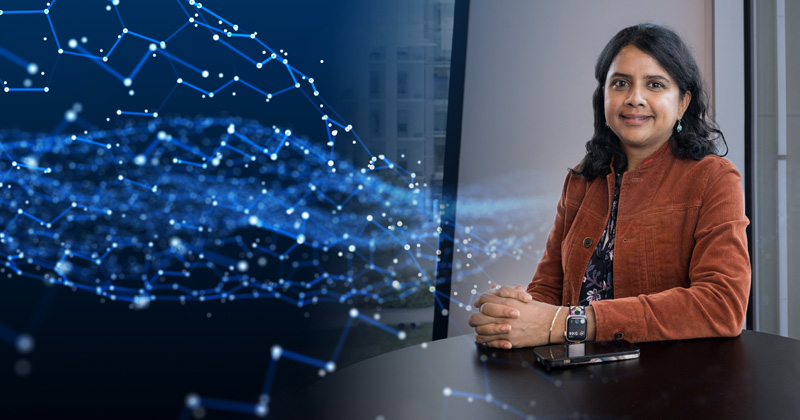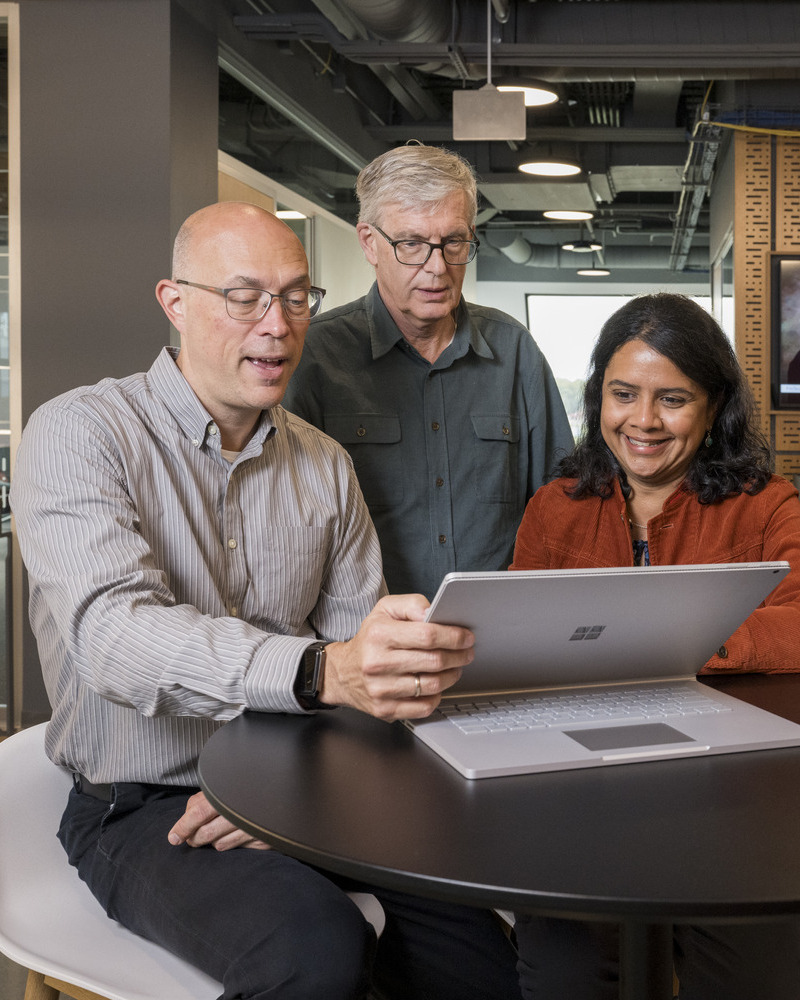


University of Delaware launching First State AI Institute to push boundaries of research and innovation
Photos by Kathy F. Atkinson June 24, 2025
Internationally recognized expert to lead pioneering initiative
At a time when artificial intelligence is being developed behind closed doors — generating “black box” systems that make it impossible to see how decisions are made and whose values are embedded in them — the University of Delaware is taking a different approach.
With the launch of the First State AI Institute, UD will advance an open, human-centered vision of AI — one rooted in transparency, accountability and the public good. The institute will develop practical tools to help researchers analyze data and streamline complex tasks, while also exploring how AI can improve campus operations.
“I am thrilled to announce the establishment of the First State AI Institute at the University of Delaware, under the distinguished leadership of Dr. Sunita Chandrasekaran in our College of Engineering,” said UD President Dennis Assanis. “This pioneering initiative represents a major step forward in our commitment to advancing artificial intelligence and applying it in ways that can truly transform the University. The institute has the potential to become a national model for how AI can be used to drive research and to strengthen the infrastructure that supports it.”
The new institute will operate from the FinTech Innovation Hub on UD’s Science, Technology and Advanced Research (STAR) Campus, strategically located near two of UD’s major AI resources: the Data Science Institute, a nexus for interdisciplinary research and collaboration that advances large-scale research proposals and helps train future leaders in data-driven discovery; and the AI Center of Excellence, which fosters research excellence using high-performance computing and will serve as the institute’s anchor for research efforts. The establishment of the institute will expand UD’s AI footprint — both on campus and in national conversations about the future of science, education and technology.
“Our focus will be on developing open-source and transparent solutions through AI models customized to meet our problems and needs, rather than relying on opaque models,” Chandrasekaran said. “We want AI to serve people, not mystify or displace them. And this approach will enable us to be on the cutting edge.”
Leveraging the University of Delaware's proven track record in successfully deploying and maintaining high-performance computing (HPC) systems, the institute will build and design specialized AI hardware, through generous funding made available by the Unidel Foundation, to provide the necessary computing power to handle the deployment of customized AI models, ensuring trustworthiness, data security and privacy, integrating across our AI resources, and supporting teaching, research and administrative services.
The initiative also will lean on a growing team of Research Software Engineers (RSEs) — a relatively new class of professionals who help translate scientific goals into usable code and algorithms. Chandrasekaran leads Democratizing Access to Research Software Engineering (DARSE), a $4.7 million National Science Foundation-funded effort through the Strengthening the Cyberinfrastructure Professionals Ecosystem (SCIPE) program, that aims to build a robust talent pipeline of RSEs for the research workforce, providing training, certification and career development. These RSEs will help support UD researchers from any discipline in exploring and developing AI software tools.
“Some scholars may not realize how AI could accelerate their work,” Chandrasekaran said. “A big goal is to simply open that door for them — to sit down and explore the possibilities, and the RSEs will play a key role.”
The institute also plans to explore AI applications for improving university operations — such as building a “compliance checker” for research proposals that can flag missing components or formatting issues before submission.
But for all the potential, Chandrasekaran remains clear-eyed about AI’s limits.
“All the hype makes it sound like your job will disappear tomorrow,” she said. “That’s just not the case. Humans absolutely must stay in the loop — especially when many models are trained on unknown or unreliable data. We’re building systems where trust, transparency and oversight are baked in.”
A dynamic leader for a dynamic institute
Chandrasekaran, who holds the David L. and Beverly J.C. Mills Career Development Chair in UD’s Department of Computer and Information Sciences, is internationally recognized for her work at the intersection of AI and high-performance computing. Her work has taken her from orchestrating large-scale hackathons at UD, where teams of students come together to develop computer code to solve problems facing fields ranging from aerospace to biomedical science, to leading an international team in stress-testing plasma physics software for use on Frontier, the world’s first exascale computer, located at Oak Ridge National Laboratory.
Her students at UD helped code and test other software tools now used on Frontier, which can complete over 1,000,000,000,000,000,000 (that’s one quintillion) calculations a second and is accelerating research in areas ranging from medicine to deep space exploration.

In addition to her role as co-director of UD’s AI Center of Excellence alongside colleague Kathleen McCoy, Chandrasekaran serves as vice chair of Delaware’s AI Commission and advises the U.S. Department of Energy as a member of its Advanced Scientific Computing Advisory Committee.
“Dr. Chandrasekaran is a dynamic leader who is helping shape the future of scientific research through artificial intelligence,” said Miguel Garcia-Diaz, UD’s vice president for research, scholarship and innovation. “With expertise in computer hardware design and AI software development, coupled with a deep commitment to using AI ethically to improve people’s lives, she is the perfect choice to lead the First State AI Institute at the University of Delaware.”
The institute’s leadership team also includes Rudi Eigenmann, Distinguished Professor of Electrical and Computer Engineering, and John Huffman, director of IT-Research Infrastructure.
Two RSEs have already joined the team, including Kevin Bhimani, who started at UD last month after receiving a doctorate in physics from the University of North Carolina at Chapel Hill. He enjoyed building AI models and writing software for a nuclear physics experiment during his doctoral research, an experience that attracted him to the new role at UD.
“This position really translates very well to what I want to do — you are solving problems, whatever the field,” Bhimani said. “I have always been very curious, and I just love learning. Being an RSE provides me with a broad horizon to help people imagine the things they would like to do, but may not have the technical skills to do. Helping people find solutions — that’s very rewarding."
Contact the First State AI Institute via this email. A website is under development.
Contact Us
Have a UDaily story idea?
Contact us at ocm@udel.edu
Members of the press
Contact us at mediarelations@udel.edu or visit the Media Relations website

